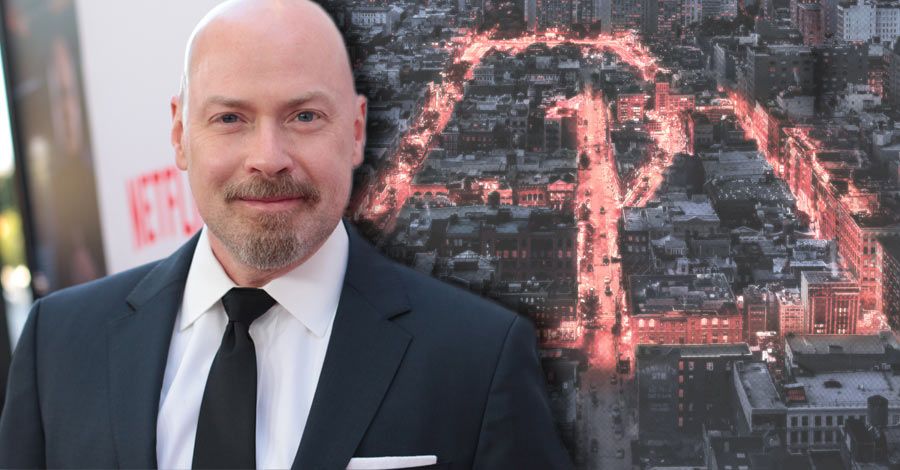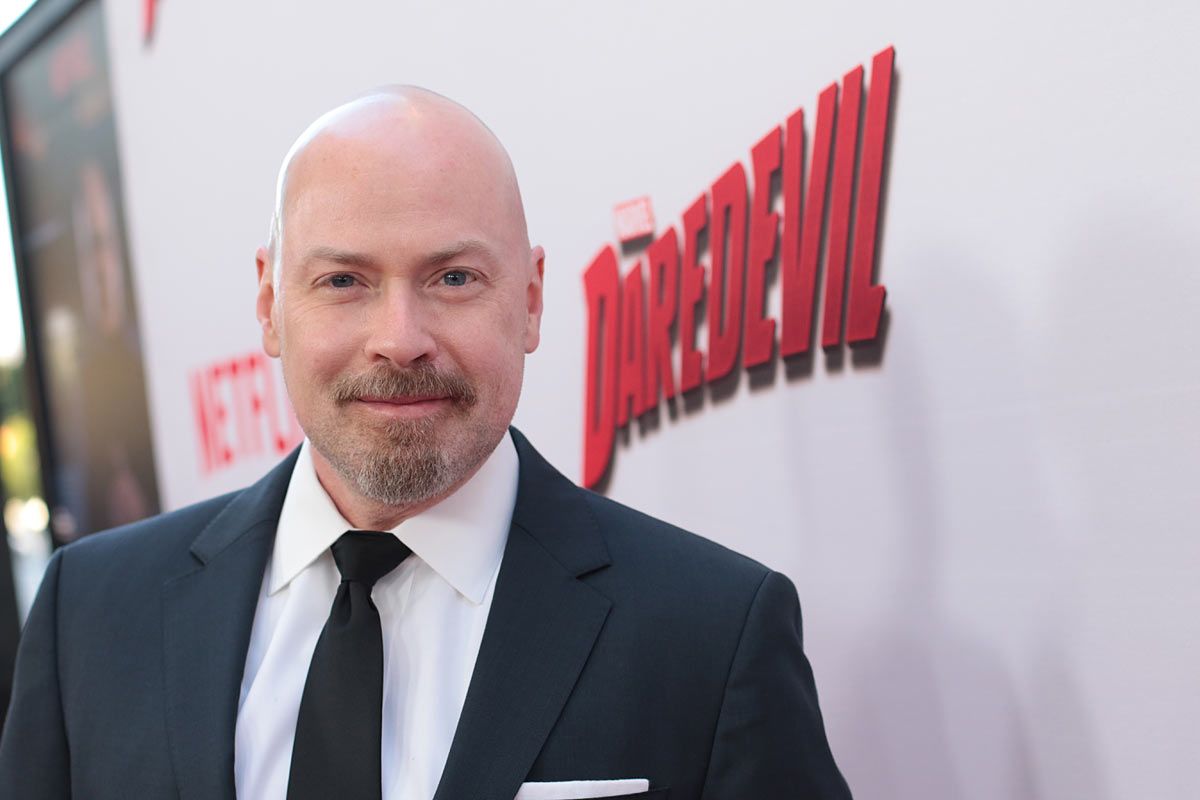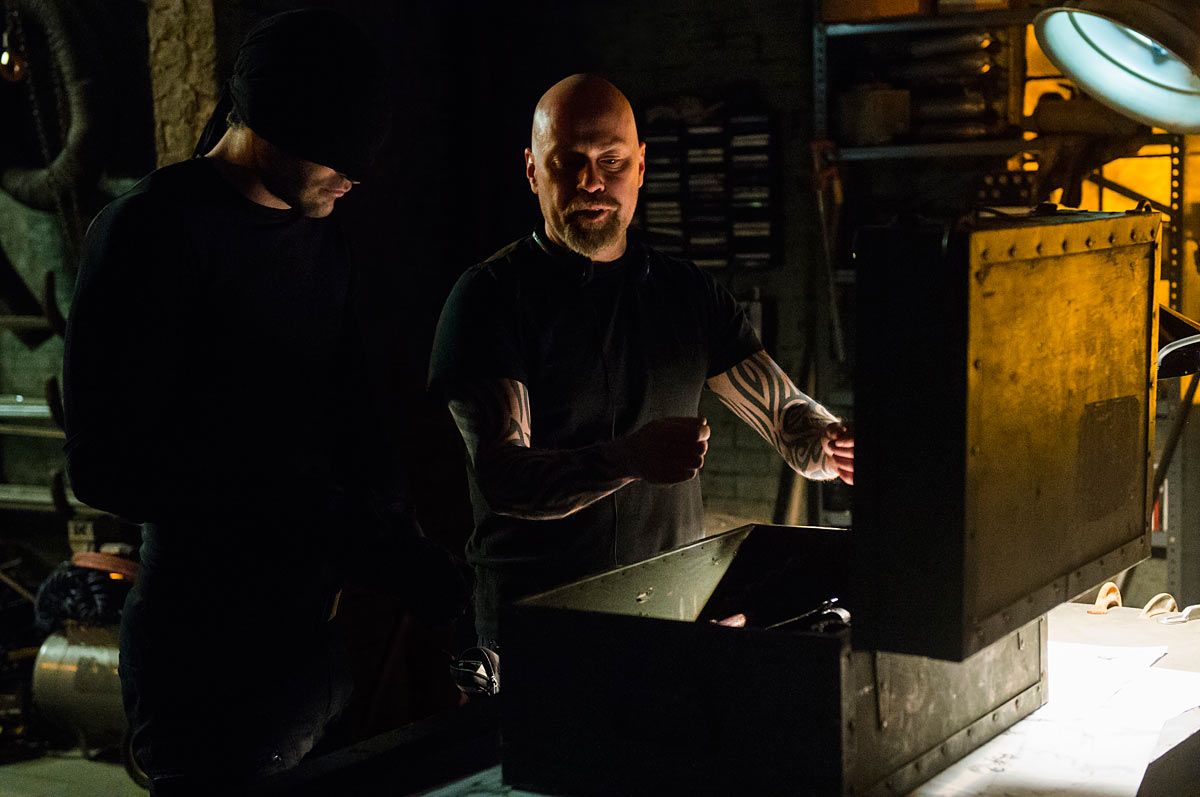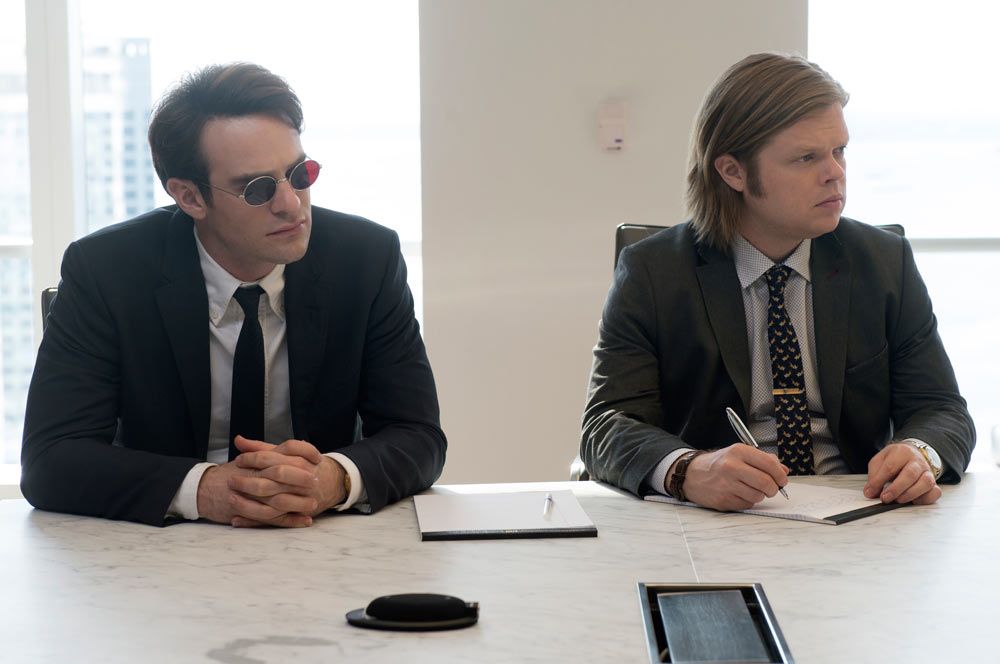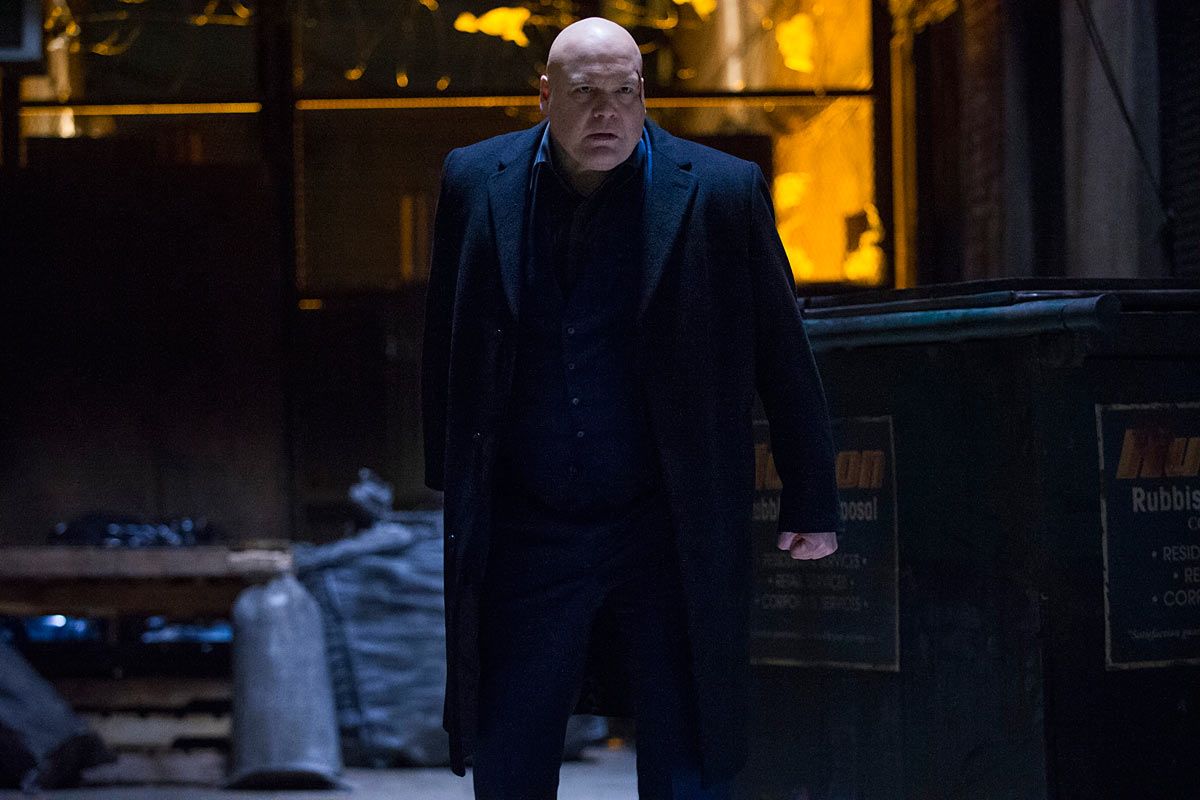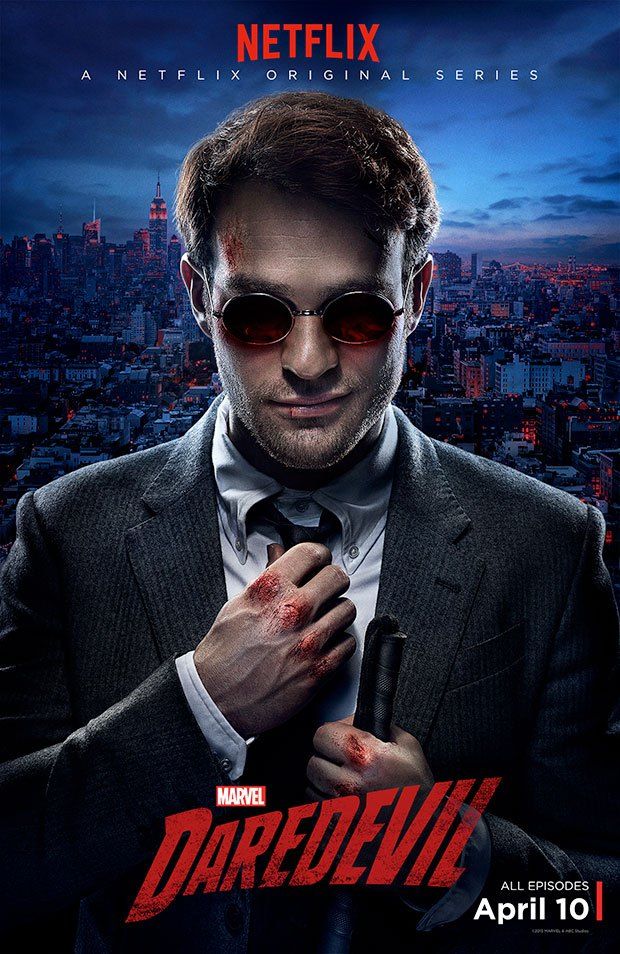Steven S. DeKnight knows a little something about bringing big mythologies to the small screen.
The writer-producer had already a rich history as part of the teams that built the lore of "Buffy the Vampire Slayer," "Angel" and "Dollhouse," and mined the legends surrounding Superman and Spartacus for "Smallville" and the various Starz series when he was tapped to step in as showrunner for Marvel's "Daredevil" series on Netflix when original executive producer Drew Goddard's schedule kept him from continuing on the project beyond the initial two episodes.
Not only had DeKnight frequently collaborated with Goddard in the past, he came into the show with Daredevil fully on his own radar, extremely conversant with the mythos behind Marvel's Man Without Fear as a longtime fan of the character and its standout source material.
SPOILER: Marvel Reveals "Daredevil's" Red Netflix Suit
One part comic book fan and one part experienced Hollywood creator, DeKnight sat down for a lengthy conversation with CBR News to provide insight into how the groundbreaking series -- as Marvel Television's first entry starring a full-on costumed hero, its first attempt at a completely binge-able release, uniquely grounded in a gritty New York City reality and setting the template for three more street-level superhero series to come -- was brought to life.
CBR News: What was the biggest creative thrill for you in doing this, and what was the biggest creative challenge?
Steven S. DeKnight: The biggest creative thrill was every part of it. I grew up reading Marvel Comics, and when I was a little kid -- before I could even read -- my cousin who lived across the street was a teenager, and he decided he was too old for comic books, so he gave me a big box of comic books and that was my introduction. And it was Marvel and DC, and I page through the pictures making up my own stories. And years later when I could read I went back to them and was stunned that my stories were completely wrong.
So I grew up reading comic books and particularly had a love of Marvel, and like many people of my generation I was really, really blown away when I read the Frank Miller run, and much later when I circled back to Daredevil I was again blown away by Brian Michael Bendis and Alex Maleev's run and particularly that run, visually, we really took a lot of influence from for our show, along with the classic movies of the '70s in New York -- "The French Connection" and "Dog Day Afternoon" and "Taxi Driver" were really our spiritual influences.
I got the sense that you could really take your time and do a nice, slow buildup, with major thrills here and there as the energy amps up. Was that intentional knowing that people were likely going to devour each episode one after the other while watching on Netflix?
Oh, very intentional, yeah. When people can binge-watch you can do that a lot easier. If you're doing that week to week it's a little harder, because people feel "Oh, well, not a lot happened in that episode..." even though there's a lot of human drama that happens. So it was very liberating to do that.
And I remember one of the first things that I did when I came in -- the first two scripts had been written by Drew Goddard, and Drew and I go way back to "Buffy" and "Angel" together, have written scripts together and have huge, huge mutual admiration, he's a phenomenal writer -- bit in the original first episode the last scene was the introduction of Wilson Fisk, and one of the first things I said was, "You know, I think we should move that to the end of Episode Three and spend a couple of episodes where we talk about him and we feel his presence but you don't see him. And I think that'll build up this bigger-than-life character." And then when you finally see him, that scene is just the way Drew had written it, which was one of the things that made me want to do this series, when I got to the end of that first episode and read, "Here's Wilson Fisk, the Kingpin," and the first line he says is "It makes me feel alone." It was like "Okay, now we're talkin' -- this is something I can dig my teeth into."
"Daredevil's" Charlie Cox Says He's Ready to be a Role Model
How easy or difficult was it for you to figure out how you wanted to weave in the origin story via flashbacks. Was there a lot of debate as to how and when you'd get around to depicting the origin, how you wanted to lace it into the contemporary story?
I gotta tell you, hats off to Drew Goddard -- that was all in there in the first two scripts. It shifted a little bit here and little bit there, a little massage, but the basic structure was decided before I came in -- and again, it was one of the things that made me want to sign on to it, because I love the fact that you didn't spend one entire episode on his origin story.
It's really about Matt Murdock now, wrestling with things from his past and trying to really balance all the things in his life: the law, his gifts, the fact that his father didn't want him to be a fighter -- any kind of fighter, and that's what he does every night. And the idea that he wants to make his dad proud -- and I think there's a part of Matt deep inside that hopes that his dad would be proud that he's protecting this city, but also I think there's a huge part of Matt that knows that his father would be extremely disappointed in how he's doing it.
Do the flashbacks continue through the course of the first season?
It focuses more on the modern day. That's not to say that we'll never go back, but we didn't want to continually have "Oh, here's another flashback of Matt as a kid." And again, not to say that you won't get that, but it's used sparingly.
Tell me about the storytelling philosophy as far as building this particular corner of the Marvel Cinematic Universe, knowing that there are other shows coming and they're all going to be linking up in some way or another -- the distinction between Easter eggs and things that will be picked up as plot threads in other series.
Luckily with "Daredevil," I did not have the burden of having to link up with the other shows, because there were no other shows yet. "Jessica Jones" hadn't been written when I came in -- or I think they had an older script from working on it for ABC way back -- and so I didn't have to jibe with any of the other shows. Fortunately the burden's on them now, to jibe with "Daredevil." [Laughs] So I didn't have that problem. There are a ton of things in this show: obviously, early plot points that come together towards the end of Season One. There are also little things we plant heading toward "The Defenders," very subtle nods to what might be coming down the pike there.
So that's a little different from the Easter eggs. The Easter eggs for me are just purely little things from the Marvel Universe that don't necessarily have anything to do with the plot -- they're just there, and there are a ton of them in this show. And there are some that, honestly, are so deep and obscure that I had to look them up! Because Megan Thomas Bradner, one of our Marvel people -- whenever we'd need a sign in the background or a name where we say, "Hey, this is a good place to put an Easter egg," we'd call her up and she'd send us a whole list. And I've read comics my whole life, and I'd look at this list and say. "I don't recognize any of this stuff!" So I'd have to get on the Marvel Wiki and see what, exactly, these things were.
Can you give us a sense of how long you play out the anticipation for the costume?
I can say nothing! Nothing! Absolute secrecy! But it's interesting, you know, this idea of the costume, and I really liked, coming into it, that it was more of a nod to the Romita "Man Without Fear" starting point. But really what I responded to was the fact that Matt [Murdock] was not a hero yet. He was learning how to be a hero. That means he can make a lot of mistakes and go down the wrong path, and I find that very interesting.
There's also a practical reason for not having him suited up in the first episode -- assuming we ever get to an outfit: I'm not confirming nor denying, but if, dare I say, hypothetically, you were going to make a Daredevil outfit, it takes a long time. It takes a long time to design, it takes a long time to get everybody to approve it, and then it takes a long time to build it and a long time to test it. So again, if there were a suit, it would probably take about seven months to actually get that done. So it's another reason not to rush it.
And also in out conversations -- in our longer conversations, when we could have conversations and let the thing breathe, we never felt that there was a rush, as long as we were telling a good story. And I think once you actually see the show and him in the outfit and how it feels organic to the show, I think you kind forget that it's a black outfit and you're just along for the ride.
"Daredevil's" Henson Says Foggy Nelson Will Experience Trials and Tribulations
What can you tease, as far as the rest of the season -- people we're going to encounter, places we're going to see?
Marvel would smother me in my sleep if I teased anything. I can say in a very general way, I think the show starts off very strong, and I think it gets stronger and stronger as it goes on. There are episodes later on where there is almost no action, and you don't miss it. It's just riveting, riveting drama, and the cast is just so good.
And yet the action scenes that we've seen are astounding -- like, really, really visually fantastic.
Thank you! I have to send huge props to Philip Silvera, our stunt coordinator. If you back and watch "Winter Soldier" and that scene in the elevator, he's actually in that scene, which I never realized -- the show was over and I was watching "Winter Soldier" for something else and I go, "Hey, there's Phil!" And he was instrumental in bringing in our main stunt double, Chris Brewster, who doubled Chris Evans in "Winter Soldier," so we had the A-Team from Marvel. And Chris Brewster is like a Swiss Army knife. All the flips, all that insane stuff that you see? No CGI -- he's doing it! He's a phenomenal gymnast. We would stand there on set and he would, from a standing position, leap up in the air, spin around three times backwards, and we'd all look at each other and say "How is this humanly possible?" The idea that Matt Murdock has no special powers except his heightened senses -- he's not super-strong, he's just a guy who's pushed himself to the limit -- is what you see in the show: this is a guy who has skills, but his biggest asset is just that he will not stop. Unless you beat him to death, he will keep coming at you.
And that's one of the great things Miller brought to the character, the series, that stop-at-nothing and yet really take a beating quality.
Exactly!
Tell me more about that '70s film aesthetic and working that in, how that was going to dovetail nicely with the Miller/Bendis/Brubaker style of storytelling.
Well, you mention those guys, and that kind of filmmaking just lends itself to the portrayal of what they did in the comics. We had a lot of talks early on about how the cinematography was vital for this. And we looked high and low and were very fortunate to get Matt Lloyd, who was coming off shooting the first few episodes of "Fargo" and got nominated for an Emmy.
So when we talked to Matt about our vision for the show and we mentioned those classic films -- "Dog Day Afternoon," "French Connection," "Taxi Driver" -- and we said, "We want a show that's not over-lit like a lot of network shows that are very bright. We want to really embrace the beauty of the decay of the city, the underbelly of the city. And we want a show where if a character comes in and out of his key light and half of the face is in shadow, that's fine. Let's really explore a bold, different way of doing this." And Matt loved the idea, knew exactly what we needed, and his cinematography is just absolutely gorgeous.
And one of the other main characters of this show is New York City. I don't think you could've shot this anywhere else and have gotten that feeling that you're in New York. Our locations manager Frank Corvino, every time he would send me pictures of locations I was like, "Ah! This is amazing!" And we'd get dailies and be like "Look at this location!" I mean, besides the fantastic acting and wonderful drama that's going on, the backdrop is just phenomenal.
Tell me about being part of that greater Marvel machinery and, creatively, the fun of it, the new experience for you to be part of the big picture at Marvel.
It's always challenging when you're spearheading an IP, and I always said when I was coming in, "I'm a very opinionated person. I know what I want and I know how I want to do things, and I will push and I will fight for those dramatic elements. But on the flip side I am respectful that this is your IP." And it's not just Marvel's IP: [Marvel Head of Television] Jeph Loeb has written for Daredevil, and [Marvel Chief Creative Officer] Joe Quesada is very, very passionate -- it's his favorite character. And so I said, "Look, when it comes to questions of IP, I completely defer to Marvel. This is your baby. I'm just helping to deliver it."
So it was very interesting. I've never worked with an IP like this, that's obviously so recognizable and has such a storied history. There were definitely challenges, but the payoff was so huge that the challenges didn't matter, because when you boiled everything down to it, one of the things that I loved about this show was that all of us involved, we all loved Daredevil. We loved reading "Daredevil," we all loved comics and we could speak the same language.
Dawson Says "Marvel's Doing Something Fun" with "Daredevil's" Claire Temple
And I think there are often times when you get adaptations from comics, where they go askew is if you get people who don't know comics, because then you get a perception that comics are something completely different. A lot of people still have a perception of comics back from the "Gee Whiz" days of the '60s, or back when the Comics Code was still alive, and they're idea of comic books is the early Batman comics -- which are great in their own respect. But especially in the late '60s, the '70s and certainly the '80s, they became something different. They became more complex. And to be able to realize that on screen was just a privilege and a joy.
Within that big tapestry, has it been fun to know, 'Okay, I know they're dong this over at 'Agents of S.H.I.E.L.D.,' Joss Whedon's got this going in in 'Age of Ultron' and 'Our show has its own microcosm" -- has it been fun to be part of the big tapestry?
It was great -- but it's not like I knew what was going on everywhere else! You know, at Marvel -- rightly so -- security is a huge concern. Because in a business like this, you can't have this information leak out -- it will damage what you're trying to do. So I don't know any details about "Age of Ultron." I have no idea. At no point did somebody say, "Hey, do you want to know about 'Age of Ultron?' since you're part of the crew?" [Laughs] No...It's a little compartmentalized, but I think that's the right thing to do in this universe. Especially because Marvel fans are some of the best in the world, but people want to know information. And it's like, "Trust me, you don't want it ruined."
One of the show's greatest successes out of the gate is the casting. Tell me about finding these actors, who are really just pitch perfect.
We sweated every single decision, from the lead to a guest star. Casting to me is so important. Way back in the day I wanted to be an actor. I love actors. So we started with Charlie [Cox] and we really put him through his paces before we gave him the role, and he was just perfect for it. And from there we started to build out the cast.
We found Elden [Henson], who was instrumental: you have to have a good Foggy to play off of Matt. And Foggy is actually a very difficult part, because you can go too broad, and Elden was just the perfect person to play it. And when things get more serious later in the season, he just shines. And then of course, we always said of our three leads the lynchpin is Karen, and we looked high and low and we were starting to worry. And then Deborah Ann Woll came in and gave an audition that just had my jaw on the floor. She was perfect. I always say the wonderful thing about Deborah Ann is that there is never a false word that comes out of her mouth on screen -- she's just phenomenal.
And of course Vincent D'Onofrio. The first thing I did when I came on the show was I started saying [Whispers], "Vincent D'Onofrio, Vincent D'Onofrio..." I actually sent Jeph Loeb a picture of Vincent D'Onofrio -- I don't know what it was from, but he actually had a camel hair coat, a shaved head and a big chopper mustache, and I said, "Imagine this without the mustache!" And the reaction I got was "Yeah, Vincent's great, but do you know what his quote is on 'Law & Order?' We'll never get him." So we talked about many other people and I kept saying "Vincent, Vincent..." And then finally, shockingly, our casting director Laray Mayfield, she knew Vincent. She had worked with him on some project and kind of knew him socially and she quietly floated out the idea to him, and it turns out he was a huge fan of Daredevil and knew Wilson Fisk and was really excited about the idea of exploring this iconic character. He read the scripts, got on the phone with us, talked about our take on it and signed on, and he was just phenomenal to work with.
Another character, Toby Leonard Moore as his right-hand man Wesley -- that was the biggest nail-biter. We looked high and low, and he's really the villain on screen for the first few episodes, and he really needed to be able to match and go toe-to-toe with Vincent, so we needed somebody who was really, really great. And literally, I think, three days before that part had to start shooting, we were in New York and Toby came in and he gave his audition, and secretly all of us in the room were, like, giddy. And he's Australian, which you'd never know on the show. And we said, "You're from Australia -- it might be interesting if Wesley has an accent. Let's do it again and just use your natural accent." And it was wonderful and hysterical because he tried it and had a difficult time using his actual accent. And he said "I'm sorry, I spent so many years not using the accent, it's weird to use it!" So he left the room and had no idea that we were doing cartwheels. He left and we were like "Sign him immediately and get him to wardrobe!" What a great choice.
And seriously, every single person: Rosario Dawson -- what a joy to work with. Vondie Curtis Hall as Ben Urich -- I've been a big fan of his over the years, and he's so good. We feel so lucky, from the top to the bottom -- even the smaller roles, like Turk Barrett by Rob Morgan, we just tried to take such care to make sure everyone was as perfect as we could get them. One of the highlights of my career was getting on the phone with Scott Glenn and talking to him about the part, and Scott Glenn is Scott Glenn, exactly how you would hope he is! A man's man. He was phenomenal.
The most important question: Will there be a Stan Lee cameo?
Again, I can neither confirm nor deny a Stan Lee cameo. Throughout each episode, everybody should keep their eyes open for various things popping up.
Tell me about rubbing elbows with these comic book creators that you've admired.
It's been fantastic. I haven't gotten to rub too many elbows, but I got a chance to rub elbows with Joe Quesada which was great. I've always been a huge Joe Quesada fan. I've gotten to speak on the phone with some guys that I love, like Alex Maleev, that I just think are fantastic. That was a real high point. And I'm hoping that this will be my entry into hobnobbing with those guys even more.
Was there a scene from one of the comics that you were just, like, "Somehow, we're going to make this scene happen?"
There is a specific image from a famous comic book illustrator. I can't reveal what it is, but I was intent on getting that in somewhere, and we did. And there's a couple of other things that I really wanted to get in that, again, I can't reveal. But yeah, yeah, there are a couple of little Easter eggs like that, that I think the fans will be delighted when they discover them.
Tell me what you think the average Netflixer, who isn't already schooled chapter and verse on Daredevil, is going to love about this show?
That's the great thing about the story we're telling, is that I don't think you have to be a comic book fan or really know much about the character. We fill in all the blanks, and for us, it was always more about crafting a good crime drama more than anything else. So I'm hoping that the diehard fans will see all the things that they love, and people who know nothing about the character will find a very easy, intriguing entry into the show.
"Daredevil" Season 1 is now streaming on Netflix.

